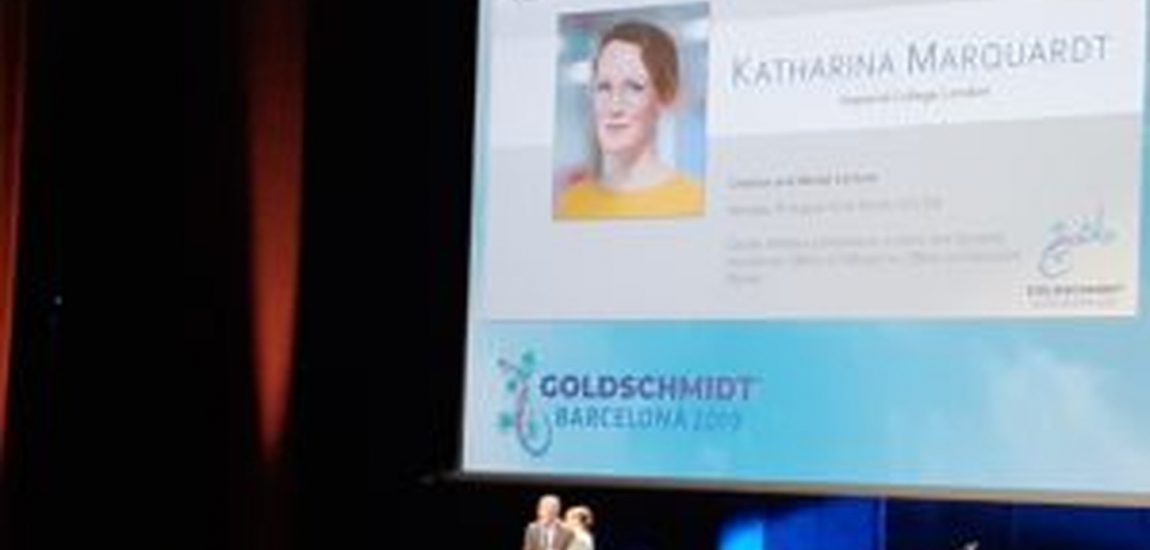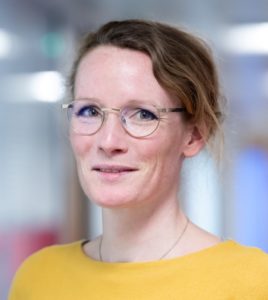
Restructuring the tenure process; reproducibility in science; and tackling climate change by example: An interview with Dr. Katharina Marquardt

Dr. Katharina Marquardt is the 2018 recipient of the EMU Research Excellence Medal, presented at Goldschmidt 2019 in Barcelona. This medal is presented to young scientists who have made significant contributions to research in mineralogy and whose professional and societal activities contribute to strengthening scientific links in Europe. Dr. Katharina Marquardt is a Lecturer in Ceramics at the Department of Materials at Imperial College London.
n the interview below, Katharina shares her thoughts on where to find the most interesting research questions, the need for reform in the expectations of an academic career path and the tenure-process, as well as how scientists need to put our money where our mouths are in our reaction to our own climate change research:
First, I want to congratulate you on your EMU Research Excellence Medal. That’s fantastic!
Thank you!
How would you describe yourself outside of your professional work?
You start with the toughest question! There is not a single answer to it: every person has a lot of different facets and different things that they like. … … I do like reading, gardening; but I am also defined by family life, with three kids. We enjoy hiking, if time permits and if the kids walk – a matter of motivation.
Can you describe the work that you are most proud of?
I think the first work I was very proud of was my diploma work. I looked at feldspars and I could tie in different microstructural features to the external evolution of the area. Especially how dislocations can evolve into small nano-tunnels that can transport fluids in and out of mineral grains. The fascination was that of the first research work: you are most impressed with the possibilities. After that you start to take analytical possibilities for granted.
These days I am most proud when I manage to combine different methods to tie my findings into a model or develop one. This is when a larger story than the pure individual observations emerges. Generally, I think most things have been done before, the evidence is usually already somewhere, but seeing it and seeing something different in what was already around is where science happens. Occasions where a lot of creative thinking comes into work and I do like that.
Can you describe your position at the Imperial College London? How long have you been there?
I started full time in January, 2019. I am, by definition, a Lecturer in Material Sciences. Lecturer means very different things in different places. At Imperial, it means I have one course to teach; this will increase over time to still relatively little amounts of teaching. All the remaining time is flexible and includes a lot of research, some administration and service to the academic community. I can define what research I want to do. It is an excellent place to be with great analytical facilities and brilliant researchers and colleagues.
Do you find any inspiration for your research while teaching?
Of course, that is why I personally think research and teaching should be coupled. Both sides benefit: students get insight into state-of-the-art research and the teachers have the chance to get at the bottom of general concepts once again. Even employed in a pure research positions I think it is cool if they (the researchers) have the chance to do some teaching.
Can you describe the journey that led you to your position?
When you look at my CV, it looks very straightforward: I did my PhD, followed by a post-doc, I got a post-doc grant, went to BGI, I had a Akademischer Rat position to do my habilitation. Then I went to Imperial as lecturer. The truth is more complex. Hauke, my husband, is also a scientist; we are a dual-career couple plus family. Throughout the time we continued to apply for a lot of things, we opened many doors. Certain doors closed, and then you are left with various choices. We had points where we were discussing that Hauke would go to Hamburg and I would be in Potsdam. But: Long distance was never an option for me!
That is why we always continued to apply for our own project funding, to gain flexibility and a chance to be together in one place and still the research you’re interested in.
When you were applying for positions, did you ever apply together as a couple or apply as a team?
We were discussing it, but we never did it! Before trying, we debated such an endeavor with the people who offered the position. Perhaps splitting a position in two half positions and then we bring in third party funding for the rest? It seems, in general, society is still very conservative with respect to such ideas. I still think you would get much more for your money if you were to employ two on one position. The brains of two scientists, while only paying for one!
You have already touched on this, but what were the main challenges you faced along your career path?
The location issue was tough. At one point, we came to the agreement that since we are at the same career stage, the person who gets the best offer will determine where we are going. Of course, you will always end up discussing things more intensely than that.
Facing the uncertainty is something I despised. I think our system is flawed in this respect. The “systems” argument for many career stages and working in different labs is something like: you learn different scientific approaches, different systems, different ways of thinking, and become more flexible – better. But, I think you could have exactly the same benefits by tying a permanent position early on to the requirement of spending for example 3 months of every year in a different lab. This would allow you to have a permanent social network, build a family, while still getting all the benefits of the “wandering scientist”. I believe (and I have a strong opinion about this) that after a PhD and maybe two years as a post-doc, you do know if a person is a good scientist or not. I think this risk of employing someone how is not as good as you assumed is non-existent. It is just a fear and this idea of: “I had a hard life – and it did me good – so it must be good for others too”. It is not productive.
So, you think the current tenure-process needs to be revised?
Totally! We are so self-selecting and this in so many ways. We require scientists to be very communicative and able to build a large network. By this we are losing a lot of highly capable researchers who may not have these social abilities, but they might be the best scientists. I hope I never make this mistake myself when I am on the hiring side.
More generally, what do you think are the main challenges facing science today?
Bringing science and society to better comprehend each other. I wish people without a scientific background could value scientific research again. We should not pretend to have something new and world-changing. Right know we caused a situation where every normal citizen can see that what we researchers communicate it is often not true (as suggested in the media). We have a situation where the next plastic digestating bug and the next cure for cancer is reported every half year, if not more frequently. But everyone can see that we still have islands of plastic and we know people who die of cancer. How dare we (including scientific journals and media) suggest that some tiny advances (even though great!) are world changing? We should be extremely clear about the direct (“short term”) impact of our work.
Furthermore, data in high-impact journals, should be replicated. How about publishing high impact – but if it is proven or disproven – these works should become part of the first work and obtain citations automatically with the first work. This way we value the scientific principle.
Right, journals are typically focused on asking ‘is this new’, rather than ‘is this reproducible’. What is the best way to tackle these challenges? Is there a role for scientific societies in addressing these issues?
Probably, only scientific societies can make a change here. High-impact science should be localized in scientific non-benefit organizations.
Has a particular society or institution had a strong influence on your scientific advancement?
I really profited from being at the Carnegie Mellon University in Pittsburgh. Especially the open discussions with little hierarchy were very stimulating. Of course, all the other institutions, especially BGI, but also NCEM, TUB and GFZ left their imprint.
The best scientific progress I made was during interdisciplinary discussions. This might be because at boundaries between disciplines you usually find a greater willingness to go back to the fundamentals and explain the background. Knowledge is more readily assumed to be common during inner disciplinary meetings. Maybe we should give more detail!
What is the best advice you received, or that you would like to pass on to young scientists?
Don’t be afraid to define yourself and to get research funds from the very beginning. Try to go in your own direction. There is no standard career path for you to follow.
What major question do you hope to see answered in the next 50 years?
I hope we can address climate change much quicker than that. I hope we can reduce the tremendous amount researchers travel by plane. Maybe we could hold scientific meetings without traveling by plane? I recently heard about the idea of having a main conference and remote places where people would gather, without meeting on the same continent. This is also an opportunity for people who cannot afford to go to these increasingly expensive meetings.
Or we could cover travel expenses only for the use of trains (continental)? If all scientist make this effort, we could prove that we not only understand climate change from a scientific point, we also act accordingly. This way we gain more scientific credibility and trust from the general society. If we are not acting according to our findings, or the findings of our peers, how can we expect politics to do it, let alone any other person? Trains take a lot of time – ok we all don’t have enough time – but: 90% of people work on the train.
For international conferences, I think we could certainly reduce their frequency?
